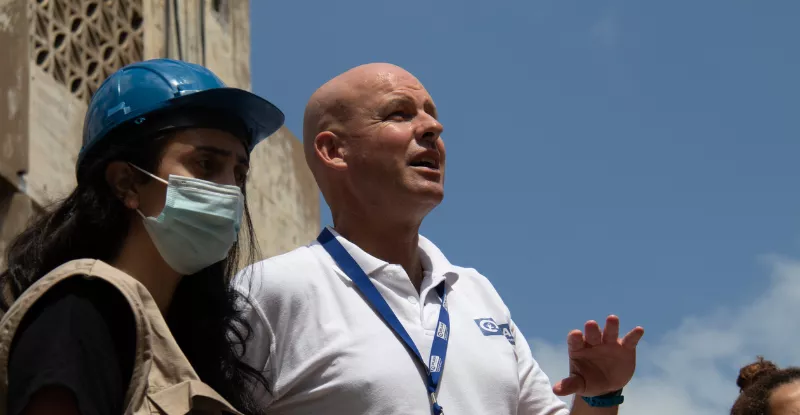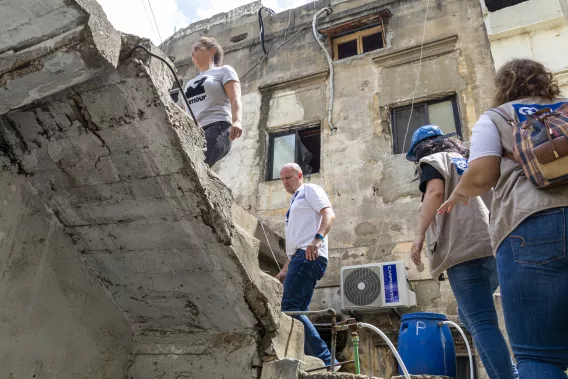

With an interest in international affairs, Colin Lee graduated from UL with a Masters in International Studies in 1993. Just months later, at the age of 22, he found himself on a plane to Croatia. Colin explains “It was pre-the Dayton peace accords that ended the conflict and there were opportunities knocking in the Balkans.” It was his first taste of overseas humanitarian work and Colin knew immediately that this was what he wanted to do.
Fast forward almost 30 years and Colin’s current role as Director for Plan International in the Middle East region (with responsibility for establishing and managing the country offices in Lebanon, Jordan & Turkey) allows him to have an impact as an experienced humanitarian professional. Plan International is a development and humanitarian organisation that advances children’s rights and equality for girls.
I actually borrowed a suit from my brother for the interview and landed the job.”
Colin’s path to Plan International followed roles with other organisations based in Africa, including Angola, Tanzania, Cambodia and Kenya. His introduction to Plan International happened in 2003. Colin explains: “It was the height of the Celtic Tiger, Plan were setting up in Ireland and it was a very different role to the ones I had held previously.” He also reveals “I actually borrowed a suit from my brother for the interview and landed the job.” For the first month, Colin ran the organisation out of an internet cafe on Dawson Street. He relished the buzz and being at the forefront of board meetings, marketing and strategic planning, eventually becoming the CEO of Plan Ireland. “We had a superb board, a huge supporter base and the Irish Government (Irish Aid) accepted us into the fray” he recalls, “Our overseas work was right up there.”
Despite the positive direction the organisation was going in, it was all becoming slightly mundane to Colin who had always enjoyed a challenge. He had considered a move to the Middle East over many years and finally decided it was time to go. That was August 2007 and Beirut has been home ever since where Colin is married to a Lebanese national with two young daughters. He now also has an extensive working knowledge of Lebanon and the geopolitics of the wider Middle East region.
Plan International (founded in 1937) recognises the power and potential of every single child. But this is often suppressed by poverty, violence, exclusion and discrimination. And it is girls who are most affected. As an independent development and humanitarian organisation, Plan is active in over 70 countries.
Trying to prevent school drop-out, child marriage and the worst forms of child labour, that’s where education and economic empowerment gives families and girls in particular a chance in life.”

Since 2017, Plan International has been working in partnership with local, national and international organisations to strengthen capacities and address the needs of Lebanese and refugee children in Lebanon. With a focus on adolescent girls and young women, Plan International Lebanon implements projects in the sectors of Child Protection, Gender-Based Violence, Sexual and Reproductive Health and Rights, Education, Youth Economic Empowerment and Participation. Colin explains that education is a big part of their work globally, “trying to prevent school drop-out, child marriage and the worst forms of child labour, that’s where education and economic empowerment gives families and girls in particular a chance in life.”
Plan International works with both host populations, refugees and displaced persons. The work is complex however, particularly in Lebanon, due to the nature of the political and confessional make-up of the country. Plan International in the Middle East supports localisation i.e. working through national partners as much as possible and employees (mostly national staff).
The sector has become a lot more professional over the last couple of decades… it is a far cry from the 1990s!”
As Director for Plan International in the Middle East region, Colin says “This involves leading and managing teams, strategic direction, security, contextual analysis, dealing with government, UN, international & national NGOs and the security forces, all of these are part and parcel of the job.”
Keeping up with the latest trends, and training requirements (including security, counter fraud, safeguarding, etc.) are all paramount for Colin and there is a huge amount of writing involved in the daily role. As the sector has become a lot more professional over the last couple of decades, the compliance requirements and standards in general have also increased substantially. Colin muses “It is a far cry from the 1990s!”
 Student Centre (SU-101)
Student Centre (SU-101)
University of Limerick
Limerick, Ireland
Phone: 353 61 202475
Email: ulaa@ul.ie